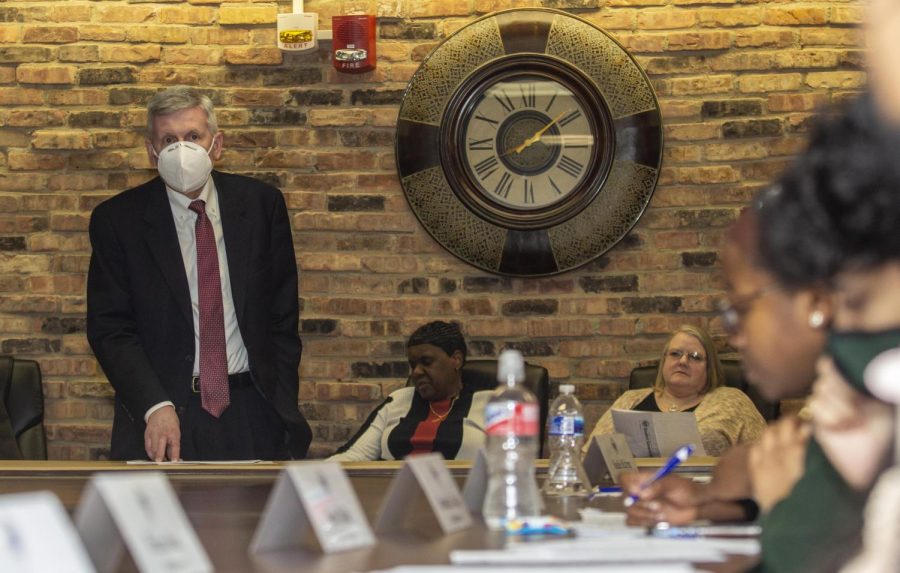Student Senate gives approval for tuition fee increases
Eastern Treasurer Paul McCann presents fee increases for multiple campus organizations and other programs for 2022-2023 during the Student Senate meeting Wednesday night at 7th Street Underground.
April 14, 2022
The Student Senate unanimously approved increasing tuition fees for both undergraduate and graduate students in the 2022-2023 school year on Wednesday night.
The cost per credit hour for the 2022-2023 school year is $323.63 for undergraduates and $329.26 for graduate students. A fee increase of $7.89 and $8.81 per credit hour respectively.
Paul McCann, director of business services and treasurer, said this was mostly due to inflation costs.
“Many of the factors or the things that we’re going to cover with this are things such as salaries, minimum wage, repairs and maintenance, utilities,” McCann said. “Those are the kinds of things the bulk of this is going to cover tonight.”
For students living on campus, they will see a 3.1% increase in tuition, housing and fees. Students in fully online programs will not see a fee increase, while students who live off campus will see increases as well.
The average Illinois university’s cost is going up 8 percent.
McCann said that when creating costs of attendance, reasonable costs for students are a high priority.
“We are looking at trying to maintain the lowest reasonable cost for the students, and we fight to do this every day,” McCann said.
The senate also unanimously approved the increase in fees to cover different functions and operations within the Martin Luther King Jr. University Union.
The recommended fee increase brought to the senate was $8.08, for a total of $31.98. This is also per credit hour.
The senate voted 14-2 in approval to increase the Grant-In-Aid fee by $0.90. These fees help students financially with all aspects of their college fees from tuition, room and board and other important fees.
The fees are mostly scholarships and are only applicable per credit hour until a student reaches 12 credits, meaning that the cost will be the same for all students taking 12 credits or more.
Approximately 78 percent of these funds go towards athletic scholarships, while 10 percent go towards students that are economically disadvantaged and 3.8% goes to honors students.
Senators Billie Frazier and Nathaniel Wilson think that such a high percentage of the scholarships going to athletes does not give other students the help they may need.
Senator Nathaniel Wilson added that he did not think this distribution of scholarships was fair to all students.
The senate voted 15-1 in approval to increase the Lantz/O’Brien and Operations fee to go towards making updates to Lantz Arena and O’Brien Field.
Senator Lesly Mendoza thinks that the updates are unnecessary.
Bobbi Kingery, director of career services, also asked for an increase of $7,000 to the Career services budget. While this usually goes to an apportionment board, the senate was serving in its lack of attendance.
An apportionment board is a governing body that determines where a set of funds go. In this case, the senate will determine if they think this is appropriate funding for career services.
Kingery said that 86 percent of the class of 2021 either has a full-time job or is in graduate school.
Both the student government and university board budgets for the 2022-2023 fiscal year were unanimously approved.
Katja Benz can be reached at 581-2812 or at [email protected].




















































